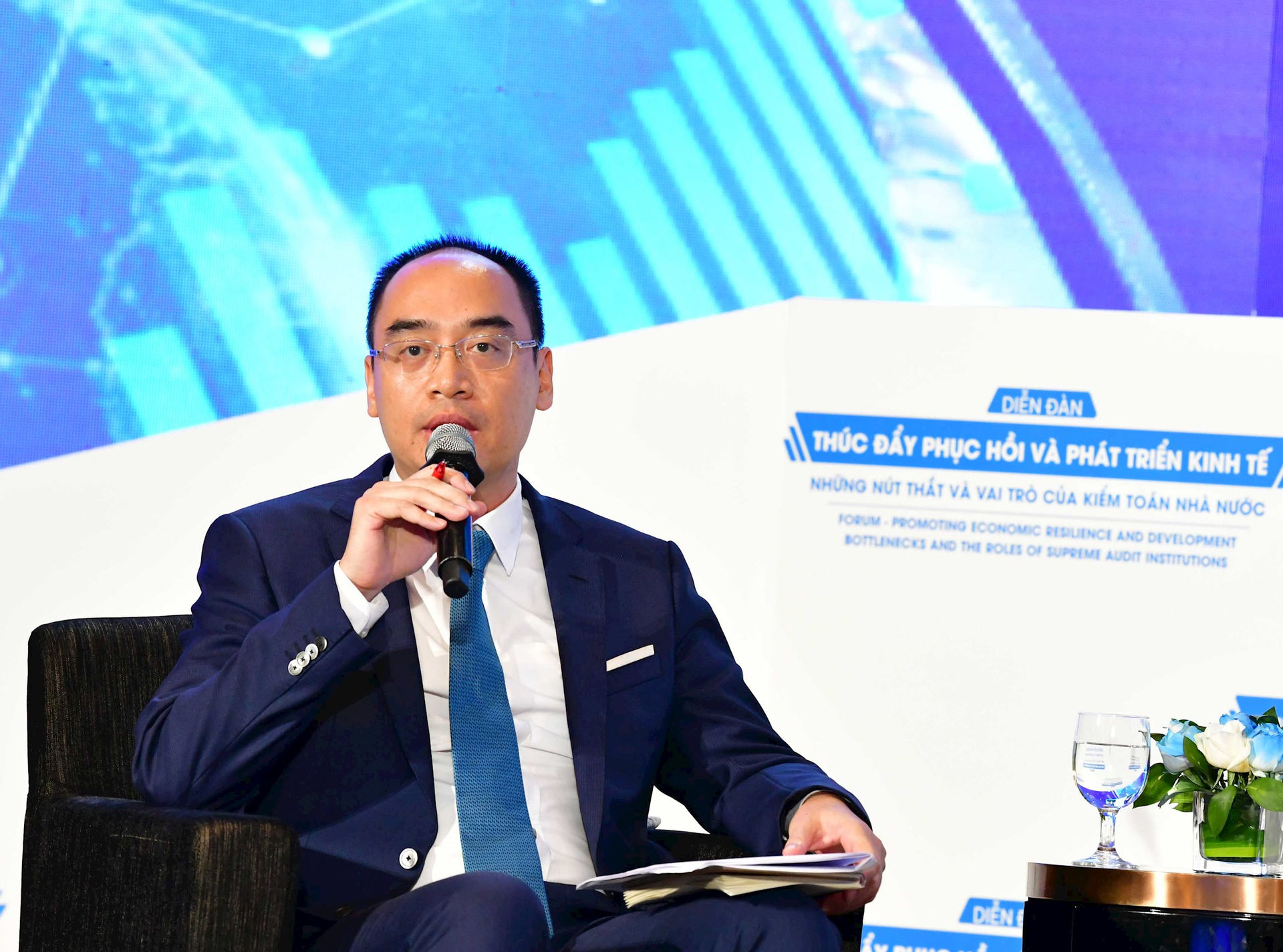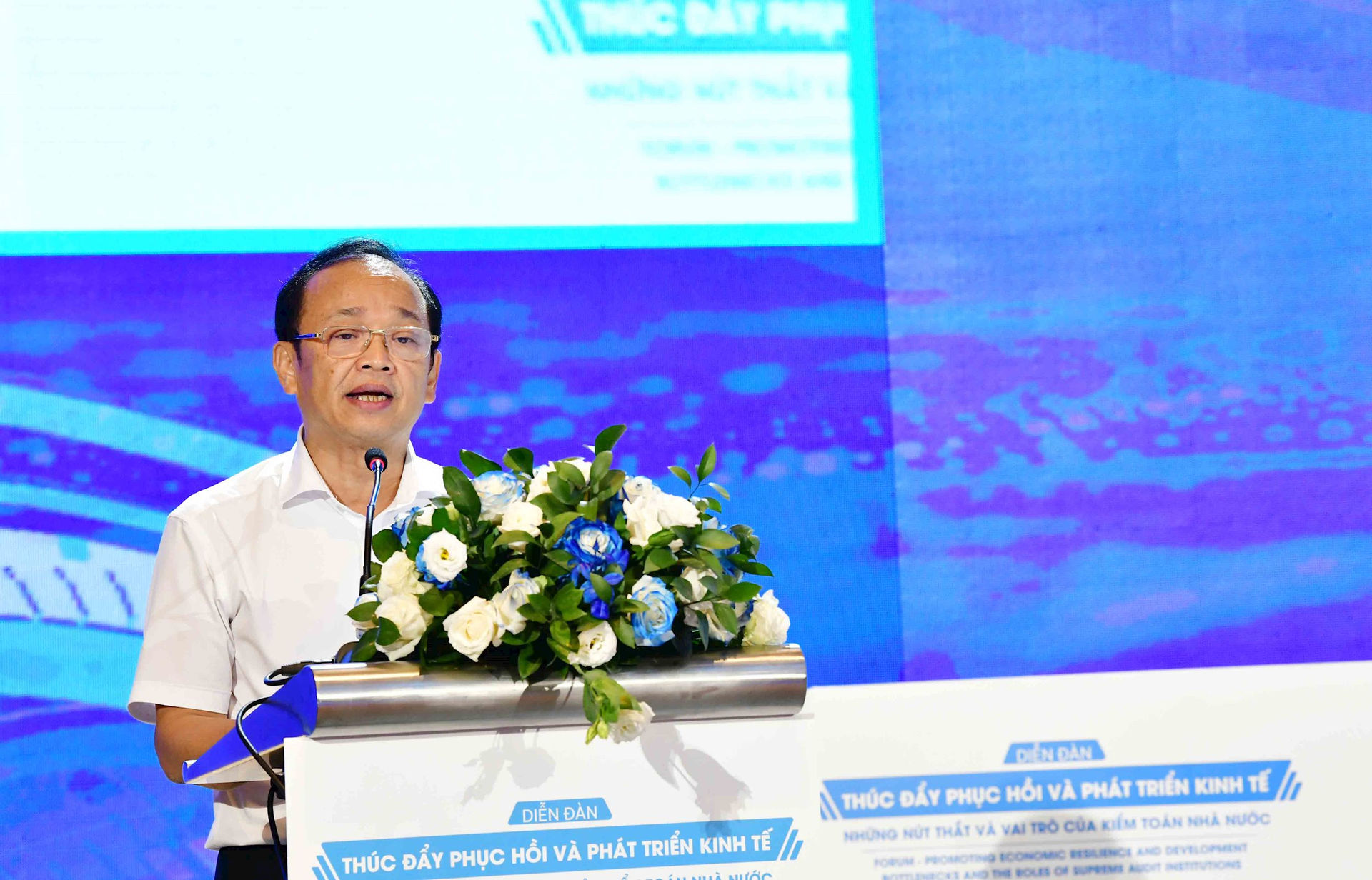With three thematic workshops and one plenary session, the Forum “Promoting economic resilience - bottlenecks and the role of the State Audit Office of Viet Nam (SAV)” was a resounding success, thereby affirming SAV's crucial role and position, showcased its close cooperation with the National Assembly, the Government, ministries, branches and localities, and highlighted its commitment to resolving bottlenecks and promoting economic resilience and development.

Deputy Auditor General Bui Quoc Dzung chaired the thematic workshop.
Following the three thematic workshops, SAV organized the forum's plenary session in the afternoon of the same day in Ha Noi.
To contribute further solutions to remove “bottlenecks” to promote economic resilience and development
Speaking at the opening ceremony, Mr. Hoang Phu Tho, Director General of Legal Affairs Department stated that with its constitutional mandate, SAV has a critical role in inspecting and evaluating the implementation of policies and laws on management and use of public finance and public assets and overall economic management.
Mr. Hoang Phu Tho delivered the opening speech
In recent years, all activities undertaken by SAV have rigorously aligned with the direction and policies of the Party and the State. Audit findings, particularly those from thematic audits, have illuminated the bottlenecks in mechanisms, policies and laws that are adversely impacting economic dynamism.
“To generate further insights and solutions to help remove bottlenecks, difficulties and obstacles to promote economic resilience and development as well as clarify the role and responsibilities of SAV in developing legal regulations, supervising and supporting law enforcement, today, SAV organizes the forum “Promoting economic resilience and development – bottlenecks and the role of SAV”, emphasized Tho.
Preceding the Plenary Session, three thematic workshops were held concurrently on the morning of October 18. Nearly 700 delegates, including leaders of the Committees of the Naional Assembly, Ministries, Provinces, Cities, experts, scientists, and representatives of embassies in six countries including Cambodia, Canada, Indonesia, Laos, Malaysia, Sweden and the World Bank (WB), universities, research institutes and organizations, international audit companies, associations, state-owned enterprises, private enterprises, project management boards,... attened the workshops.

Mr. Nguyen Anh Tuan, Chief Auditor of the Regional State Audit Office No.I delivers report on theme No.1 at the plenary session
To develop a new, comprehensive and more effective policy framework for land management
With reference to the results of thematic disussion No.1 on “Land management and land price determination - Inadequacies from practice and through state audit activities”, Chief Auditor Nguyen Anh Tuan said that the presentations and discussions focused on clarifying and deeply analyzing the nature and causes of the inadequacies, problems, and shortcomings - the main “bottlenecks” in the management and use of land and land valuation.
Overview of the plenary session
The delegates identified six main bottlenecks including the followings: (i) policy mechanism; (ii) construction and land use planning; (iii) land recovery, compensation and site clearance; (iv) land allocation, lease and price determination; (v) land use management after allocation, lease and (vi) land prices and land price determination.
Offering both general and specific solutions to address limitations and inadequacies in land management, use and price determination, the workshop prompted delegates to propose a focused approach. They suggested prioritizing the completion of amendments to the 2013 Land Law and others relevant legislation, which aims at building a new, comprehensive, and more effective policy framework for land management; developing guiding documents under the Law while ensuring the quality and progress and effectively addressing the identified challenges.
Mr. Le Dinh Thang, Chief Auditor of Specialized Audit Department No.II delivers report on theme No.3
During the course of the forum, delegates focused on discussing various topics such as bottlenecks of public investment and disbursement of public investment capital; tasks assigned to SAV to expedite the progress the progress of disbursement of public investment capital; audit findings on problems and violations on land management; inadequacies in determining land prices according the surplus method, changing the purpose of land use to carry out commercial housing projects at enterprises during the equitization process; identifying issues that need to be resolved to develop truly sustainable and responsible economic zones and industrial parks of SAV. Most of the delegates also emphasized that SAV’s role and responsibilities should be promoted to organize and implement the inspection, examination and auditing of land resource management and use in a scientific and effective manner. Accordingly, SAV shall develop tasks and focus on auditing to detect problems and inadequacies in policy mechanisms, management organization and contribute more voices to the localities, the National Assembly, the Government and ministries for prompt adjustment and completion. Additionally, SAV needs to propose measures to address violations of land management and use.
Solutions to improve the efficiency of using public investment resources
During Workshop No.2, titled “Public investment: Bottlenecks and solution from the auditor’s perpectives”, Mr. Vu Ngoc Tuan, Director General of the General Affairs Department, highlighted the key findings . Delegates identified 07 groups of issues related to difficulties and obstacles in public investment activities, including: Policy mechanisms; capital sources; planning works; site clearance works; raw material sources; the performance of duties and responsibilities of individual units/organizations; organization and implementation of investment projects.
Based on the discussions, delegates put forward several solutions to enhance the efficiency of using public investment resources. These solutions encompassed the followings: To continue to review to thoroughly handle inadequacies, limitations and gaps in Law on public investment and other relevant ones; to improve the efficiency of public investment capital mobilization; to improve the quality of forecasting, coordination, construction, allocation and assignment of medium-term and annual public investment capital plans to ensure focus and emphasis on important issues in line with project implementation progress; and to timely and flexibly adjust capital plans. Along with that, the coordination among levels, sectors and localities should be improved to speed up the site clearance, conversion of forest land use purpose and provision of adequate materials to serve the construction of important national and inter-regional projects. The role and responsibilities of heads of agencies/units and organizations should also be enhanced to lead, direct, inspect and urge the implementation of projects and disbursement of public investment capital. Moreover, the inspection, examination, auditing and supervision should stimultaneously be strengthened to promptly detect, handle and remove difficulties and obstacles in disubursement works and prevention of negative behaviours and violations of law in order to ensure open, transparent and effective public investment.
Notably, the workshop proceedings highlighted SAV's critical role in optimizing the effectiveness and efficiency of public investment. Accordingly, it is said that in order to perform this role well, SAV needs to enhance its quality when providing comments on investment policies for important national projects and target programs; develops a medium-term and annual audit plan in line with the National Assembly’s Resolutions on public investment plans with a focus on key projects; promotes performance audits and new thematic audits for the public investment sector./.